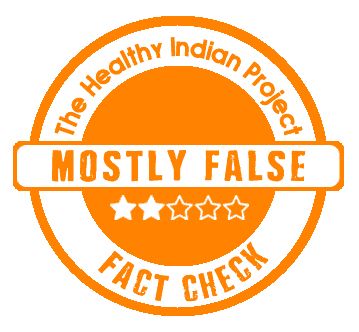Last Updated on March 21, 2024 by Neelam Singh
Quick Take
A highly popular Instagram post suggests using water as a blood thinner. We fact-checked the post and found that it is mostly false.

The Claim
According to a widely shared Instagram post titled “The Healthyy Habitat,” staying properly hydrated is essential for maintaining blood thinning and circulation, which means that water is a potent blood thinner than warfarin.

There have been various claims on social media asserting the use of various home-based remedies such as onions, pomegranate, and peepal leaves. To ensure the accuracy of these claims, we thoroughly examined the facts.
Fact Check
What precisely are blood thinners? What is their main purpose?
Blood thinners are prescribed medications that stop specific blood components from adhering to one another. Eventually, this stops blood clots from developing. They can be used through the skin, intravenously, or orally to prevent blood clots from forming. The principal ones include oral anticoagulants, antiplatelet medications, and heparin.
It is imperative to emphasise that the mechanism of action of these medications involves disrupting the distinct phases of the innate coagulation cascade. These may decrease platelet aggregation, preventing the synthesis of fibrin, a protein implicated in the development of clots. It should be made clear that none of these medicines thin the blood; rather, they all lessen the chance of clot formation.
These medications are beneficial for certain conditions such as coronary artery disease, pulmonary embolism, atrial fibrillation, and deep vein thrombosis. As a result, they help maintain blood’s simple flow through arteries and veins. Ultimately, this reduces the risk of serious adverse consequences like heart attacks, strokes, and blockages.
Blood thinners are, therefore, essential for both treating and avoiding major heart issues. This can help patients reduce their risk of contracting potentially fatal blood-clot-related disorders.
Is it possible to use water as a natural blood thinner?
No, not at all. It should be made clear that since water is not a blood thinner, it cannot replace warfarin or any other blood thinner. While staying hydrated is good for your health in general, drinking water does not thin your blood as much as taking prescription blood thinners. Thus, it may be deceptive to believe that water thins blood. Excess hydration, however, can increase the likelihood of heart-associated, life-threatening conditions. Nonetheless, water will always promote blood clotting and protect against circumstances that can cause a blood clot.
Anticoagulants, another name for blood thinners, are prescription medications made especially to stop blood clots from forming. Usually, they work by targeting several variables that trigger the formation of blood clots, either to prevent excessive clotting or to disintegrate clots that have already formed.
In doing so, the medication reduces the chance of thromboembolic events. Water therefore lacks anticoagulant qualities and cannot be used for conditions such as deep vein thrombosis, pulmonary embolism, or atrial fibrillation.

When we asked Dr. Debasish Mohapatra, Associate Consultant at BM Birla Heart Research Centre, Kolkata, if water can be a potential blood thinner, he advised that water cannot replace prescription blood thinners such as warfarin. Although it lacks anticoagulant qualities, maintaining hydration might be beneficial. While excess water intake can be a substantial risk factor for patients with heart failure by precipitating heart failure symptoms, water cannot take the place of prescription blood thinners. Therefore, blood thinners are necessary to prevent major illnesses like heart attacks, strokes, and blockages.
Another significant concept that has to be taken into account is that of the natural blood thinners. These compounds and formulations are believed to help reduce the blood’s ability to clot. Certain foods, spices, and herbs usually exhibit anticlotting characteristics. These herbal remedies primarily include ginger, garlic, aloe vera, ginseng, and turmeric.
Although natural blood thinners offer advantages, they may not be a suitable substitute for prescription medications and may cause drug interactions. For this reason, it is imperative to consult your doctor before adding them to your supplement regimen.
What is the significance of hydration?
Maintaining adequate hydration is essential for overall health. This mostly affects various physiological functions and aspects of well-being. Primarily, sufficient hydration controls body temperature, averting overheating in warm weather or during physical activity. Additionally, it lubricates joints, lessens friction, and lessens the likelihood of pain or stiffness, all of which contribute to the maintenance of joint health. Drinking adequate water is also essential for maintaining brain clarity, focus, and cognitive function. Most significantly, enough hydration promotes intestinal health. Water helps food pass through the digestive system and keeps you from becoming constipated. Therefore, it is crucial to maintain proper hydration levels through regular water intake and awareness of thirst cues for maximum health and well-being.
Disclaimer: Medical Science is an ever evolving field. We strive to keep this page updated. In case you notice any discrepancy in the content, please inform us at [email protected]. You can futher read our Correction Policy here. Never disregard professional medical advice or delay seeking medical treatment because of something you have read on or accessed through this website or it's social media channels. Read our Full Disclaimer Here for further information.

